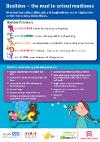The Road To School Readiness
What does it mean for my child to be School Ready?
Starting school is an exciting time for children and their parents, but it can be worrying too. As parents you will want to make sure that your child starts school with the skills they need.

Campaign poster: Basildon School Readiness Project - The road to school readiness A4 poster (PDF, 1 MB)(opens new window)
R is for Resilient, adaptable and always willing to try
Supporting your child's self-help skills so that they learn to do things for themselves
When you have got your child's school uniform, don't wait until the first day of school to put it on, give them time to practice putting it on and taking it off. Don't forget to also practice with PE kits, coats and shoes.
Free school meals are available to all children from Reception to Year 2 from September 2014, but many schools will offer the option of packed lunches as well. Help your child to use a knife and fork and carry a plate or tray. If your child is taking a lunchbox, make sure they can open it themselves and are able to open packets or boxes inside. Encourage them to tidy away afterwards.
Encourage your child to blow their nose themselves, bin the tissue and then wash their hands.
E is for Enquiring, curious, asking questions and exploring
Use everyday experiences as learning opportunities and giving your child opportunities to take the lead
Let your child enjoy being creative, by using pencils, crayons and paint this will develop their coordination.
Sing number rhymes together to support your child's Maths skills, Ten in the bed supports children to count and order numbers. On walks to and from home, see how many numbers you can spot, on buses or on front doors. Make children aware that numbers are everywhere.
Read with and to your child and encourage your child to talk about the story.
A is for assured, confident in their own abilities; independent in their self care
Talk to your child about school, they may not have been away from you for a whole day before and this can seem like a long time to a 4-year old. Talk to your child about the routines at school, schools will be happy to discuss what their day is like, and make sure they know that you will be there to collect them at the end of the day.
Make sure your child knows the name of their class teacher and any teaching assistants, so that they become familiar with them before they start school. Once you know which school your child will be attending, there are often visits to the school you could attend.
D is for Determined, striving to improve and showing pride at success
Provide opportunities for your child to meet and relate to others including adults beyond close family and friends so that they positively experience socialising, sharing toys and turn taking.
Y is for Young, eager to learn and full of potential
Talk to your child every day, this will support your child's communication skills. Talk about days out or things you have seen or done together.
Children need to be able to listen and follow instructions at school, so play games like Simon Says to practice this. Encourage your child to follow simple instructions e.g. put your bag on the table and wash your hands please. Give lots of praise to your child.
Recognise and talk through your child's feelings and different emotions.
